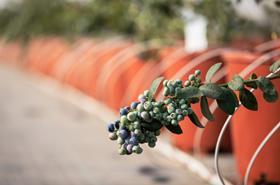
Netafim’s precision irrigation solutions have been making a difference to agriculture for the best part of six decades, fighting against scarcity of food, water and land.
In 2021, Netafim continues to innovate, utilising its advanced digital farming solutions to provide farmers with better analysis, monitoring and control capabilities.
With sustainability now at the forefront of the global conscience, and water use high on the agenda, its solutions are more relevant than ever.
“With mass adoption of drip irrigation, global food security can be a reality and we continue to pursue this as our mission,” explains Gal Yarden, senior vice-president, head of Netafim’s EMEA division. “At Netafim, we say it in four words: ‘Grow More with Less’. This means using solutions based on our core expertise – precision irrigation – to help farmers achieve higher yields and better-quality crops, while using less water, fertiliser and energy.
'Regardless of the crop, climate, soil or region, our mission is to empower smallholder farmers and large farm operations of all kinds to grow more food in more efficient ways using fewer resources. In this way, agriculture is a means of generating sustainable livelihoods that enhance the lives of farmers, their communities and society, and all those involved in the food value chain.”
The need for precision irrigation has been increasingly evident in recent times, with Netafim working on several projects across the agricultural spectrum, including an effluent subsurface drip irrigation solution for the California dairy industry, fully commercial drip irrigation for rice in countries including India, Turkey, Italy, Brazil and Greece, and a deal valued at US$85m for advanced irrigation solutions to improve the livelihood of 35,000 farmers in India.
For fresh produce specifically, the two categories that are booming globally are avocados and blueberries, rising demand fuelled in part by the mega-trend in healthy diets and superfoods.
When it comes to a high-value crop like avocados, reaching high commercial production in young orchards means big profits – and precision irrigation, fertigation and modern planting practices can make this possible.
 “Netafim accounts for a significant number of all new irrigation systems for avocados,” Yarden confirms. “Our staff are there in the orchard partnering with farmers, investors and large corporates, giving them the best possible results and return on investment with irrigation, fertigation and frost protection technologies.
“Netafim accounts for a significant number of all new irrigation systems for avocados,” Yarden confirms. “Our staff are there in the orchard partnering with farmers, investors and large corporates, giving them the best possible results and return on investment with irrigation, fertigation and frost protection technologies.
'In rainy areas, drip irrigation will allow you to deliver water during dry spells and offer an efficient fertigation system all year round. Precision irrigation lets you ‘spoon feed’ the avocado to prevent leaching and ensure that every drop of fertiliser is delivered directly to the root zone.”
Growing avocados requires an intensive farm operation that is simplified with precision irrigation, Yarden continues. Farm employees can work in the plantation without being dependent on irrigation or fertigation scheduling. The delivery of plant protection and fertilisers via the system itself reduces operational complexity and allow access of agromachinery to the orchard.
“Various trials and global best practices have shown that fertilising in small amounts throughout the growing period keeps the plant root zone continuously nourished, ensuring the avocados reach their optimal size, quantity and quality,” he notes.
For global blueberry production, meanwhile, there is an increasing trend of moving from open field cultivation to greenhouse and soilless media – this accounts for more than 50 per cent of new-planted projects, according to Yarden.
Growing in soilless substrates is totally different from growing in soil, mainly because the water and nutrient buffer in soil is much higher than in substrates. These differences affect all aspects, from equipment and protocols to best practices, and the only way to grow blueberries in soilless substrates is with precision irrigation.
“The advantages farmers get by using precision irrigation is consistency – in quality, yields and less labour,” he continues. “Netafim has more than 20 years’ experience in irrigating blueberries worldwide, covering more than 50,000ha.
“Working with Netafim goes well beyond the purchase of advanced agri-tech and irrigation products. We offer exclusive access to our wealth of knowledge about producing successful blueberry crops, gained from 20 years of hands-on experience in dozens of countries.”
When it comes to the wider picture for irrigation, the biggest change in recent years has been around digital farming and what it enables. Sensing, monitoring, controlling, data analysis and ‘call to actions’ (recommendations) will be a primary focus moving forwards, the group expects.
“We see new startups and new technologies in the agri-tech ecosystem and Netafim sees opportunities in collaborating with these to bring more value to farmers, provide market access to new technologies, while continuing to develop NetBeat, our digital farming platform,” Yarden outlines.
Looking ahead, Netafim is set to launch a number of innovative products linked to its core business in 2021, such as drip lines, sprinkler systems, filters and digital farming, while the company is, he says, also working on different business models and services that will allow extended options for drip irrigation and guarantee customer success.
“Only 1.5 per cent of global farmland and 6 per cent of irrigated land utilises precision irrigation, so the potential is huge especially in view of climate change, water scarcity and demand for food security,” Yarden concludes.



